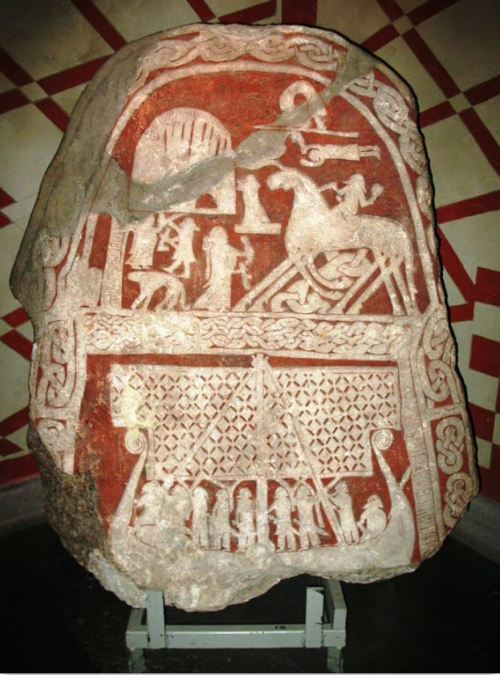#germanic
Grimm’s Law was highly successful at predicting the forms of Germanic words but there were many exceptions. However, the discovery of Verner’s Law showed that exceptions might just be apparent; sound change is still ‘regular and exceptionless’, you just have to look a bit closer for the regularities.
An example of one such ‘exception’ is father, from above.
Note how Latin pater (which retains the /p/ and /t/ from PIE) shows up as father in English. IE /p/ > Gmc /f/ as predicted by Grimm’s Law, but IE /t/ has not come out as /θ/ instead we find /ð/. More telling are examples of related words which have the predicted sound in some cases but not in others! For example, English birthandburden are both related but show different outcomes of what was historically the same consonant.
Karl Verner noticed, however, that the unpredictable instances correlated with the position of accent in PIE. Sanskrit retains much of the earlier accent system which Germanic has subsequently changed. Sanskrit pater retains the accent following the /t/. Verner noticed that Germanic results from Law A were voiced unless they were immediately preceded by an accented syllable (in which case they would be voiceless) – this is Verner’s Law. Subsequently many of these Germanic voiced fricatives became voiced stops (thus leading to birthandburden). Germanic also underwent an Accent Shift whereby the position of accent changed. This annihilated the conditions for Verner’s Law but left the results of it unchanged, i.e. the results went from being conditioned and predictable (phonetic) to unconditioned and unpredictable (phonemic).
Verner’s Law also helped to explain cases of /s/-/r/ alternations, so called rhotacism. That is /s/ was pronounced as [z] by Verner’s Law unless preceded by accent. This [z] sound then underwent rhotacism to become /r/. Old Latin shows flos-floris‘flower’, English shows was-were etc. Many of the results of Verner’s Law have, however, been lost through analogical levelling. Latin underwent levelling to yield flor-floris‘flower’ and many English dialects have levelled the was-wereparadigm (as has Modern German), i.e. you might hear people saying ‘we was, you was, they was’.
Verner’s Law was and is a fantastic example of how powerful the comparative method is when applied carefully and rigorously. It also gave a great confidence boost to the Neogrammarian Hypothesis which says that sound change is regular and exceptionless. But that is not the end of Verner’s Law…it’s still around in places. When you next come across execute and executor/executive, think carefully about where the stress falls and how you are pronouncing the <x> in those cases – you might just see Verner’s Law in action!
Grimm’s Law (also called the First Germanic Sound Shift) refers to changes which affected the stop consonants in what became the Germanic subgroup of the Indo-European language family (Proto-Germanic being the ancestor of all Germanic languages, i.e. Gothic, German, Yiddish, Swedish, Icelandic, Dutch, Afrikaans, Old English, English etc.). There are in fact three series of changes which changed some aspect of the articulation of the IE stop consonants whilst retaining the same number of distinctions (number of phonemes).
Law A: IE /p t k/ > Gmc /f θ x/
Law B: IE /b d g/ > Gmc /p t k/
Law C: IE /bh dh gh/ > Gmc /β ð γ/ (which later became /b d g/)
Exactly when this happened is not known but we can at least work when the Laws may have taken effect relative to each other, e.g. Law A cannot have happened after Law B because otherwise we would expect IE /b d g/ to show up as /f θ x/ in Germanic.
For example:
Latinpater > Englishfather, German Vater(German orthographic <v> is pronounced /f/)
Greektri > English three
Latincord- > English heart (English /h/ descends from earlier /x/)
Sanskritbhratar > English brother, German Bruder
These are standard but selective examples. Standard in the sense that you’ll find them in text books; selective in that we cannot simply look at one language and expect it to faithfully represent changes which happened hundreds of years ago. Latin, Greek and Sanskrit have undergone changes since Proto-Indo-European and English and German have undergone changes since Proto-Germanic. Modern German shows evidence of a Second Germanic Sound Shift which changed the Germanic stop consonants again! English did not undergo this change as it had already separated from the language that was to become German (compare threeanddrei,daughterandTochteretc.).
ODIN (Old Norse: Óðinn) is the main god in Norse mythology. Described as an immensely wise, one-eyed old man, Odin has by far the most varied characteristics of any of the gods and is not only the deity to call upon when war was being prepared but is also the god of poetry, of the dead, of runes, and of magic.
He also exists in Germanic mythology as Woden (in Old English), Wodan (in Old Franconian), and Wutan or Wuotan (in Old High German). The modern English weekday name Wednesday traces its origins to “day of Woden”, wōdnesdæg in Old English, and is still seen in the Dutch name woensdag.
Part of the Æsir family of the gods, he helped create the world, resides in Asgard (the stronghold and home of the gods), and gathers slain warriors around him in Valhalla (‘hall of the slain’), but is eventually crunched to death by the wolf Fenrir in the Ragnarök, the ‘final destiny of the gods’ in which the world is destroyed.
Post link
She has survived heat treat and is looking wonderful as ever! Very happy about the improvements I was able to make on forging this one. It’s much closer to where I want it to be. A little more girth between the knob and the blade on the next one and I will be happy.
.
#thepxsmith #joshaweston #forgedinfire #kinfeordeath #blacksmith #quench #handmade #celtibero #germanic #oldworld #damascus #historicalknives #knifecommunitiy (at Pixel Smith - Josh A. Weston)
https://www.instagram.com/p/CMOJvW0jBFJ/?igshid=1xwcqx2ewxrt7
These are the blades that cycle through my head on repeat. The keep me curious about their past and how they could also have a future. There is some sort of magic in the ring. The balance and comfort of a seemingly awkward grip is baffling. To make a perfectly fitting version, to my hand, would be a dream come true. Until then, that is my dream.
.
#celtibero #germanic #warknife
#thepxsmith #joshaweston #history #dreams #shortsword #drawing #sketch #iberian #historicalknives
.
The most beautiful existing version of this blade type can be seen at the museaum at @rothenburgobdertauber @rothenburgtourism (at Pixel Smith - Josh A. Weston)
https://www.instagram.com/p/CLUNfRBDRPx/?igshid=14hmrt0vcuwir
Some still shots of the celtic war knife build. It’s a low layer pattern with a forged ring pommel and globular grip adorned with cultural geometric patterns. The scabbard is of simple wood construction with forged bronze and copper fittings wrapped in hemp cord.
.
The balance is quite lovely and the grip is surprisingly comfortable. It’s got a devastating edge that can process through a 2x4 in no time.
.
#thepxsmith #joshaweston #forgedinfire #knifeordeath #celtibero #germanic #sleek #ringpommel #celticsword #chieftan #historicalknives (at Pixel Smith - Josh A. Weston)
https://www.instagram.com/p/CPHPs3Nj7i3/?utm_medium=tumblr
Post link
Spring is in the air and the raiding season is apparent. Fresh meat will grace the feasting halls directly cut by the chieftan’s ancestral blade.
.
#thepxsmith #joshaweston #forgedinfire #knifeordeath #celticsword #celtibero #germanic #ringpommel #glob (at Pixel Smith - Josh A. Weston)
https://www.instagram.com/p/CPDdm9JjcdH/?utm_medium=tumblr
Getting this globular gripped ringed pommel war knife dressed up a bit. Outfitted with some geometric patterns and a gun blue finish over the low layer pattern welded steel. Next up, the scabbard.
.
#thepxsmith #joshaweston #forgedinfire #knifeordeath #celtibero #celticsword #germanic #ringknife (at Pixel Smith - Josh A. Weston)
https://www.instagram.com/p/CO5zMEKjZjw/?igshid=btmkuqing6g0
Post link
I noticed something. You know how the word habibi (in every Arabic song) sounds like “baby” or “bby” and means “my beloved” ? well love in Arabic is Hubb (with the root letters hbb), and to add the possessive form in Arabic you ad “…i”, so my love becomes “Hubbi” which sounds almost exactly like “hubby” (husband) in English! I think it’s beautiful how words in languages that have nothing to do with eachother can connect like that, by pure coicidence.

New reading material to do research for my story. “Die Edda” or just plain “Edda”. Translated to German, but my Dutch mind should be able to make something of it, being of Germanic origin!
I’m digging deeper to find the Germanic soul or vibe so important for my story’s evolving.
Sad to know that after all those thousands of years and being all from the same origine we still are incapable of living together on the same continent.
Be safe all..
Men need a pack and not governments!
Only defensive masculinity is true masculinity. Yet your manhood should not be sacrificed for any existing state, government or religion, for they are all false: They are nothing but corrupt, ruthless and utterly destructive pigs. It is a natural law of human civilization that the dumbest come to power, for they are the easiest to control as puppets. The American President is no exception, he is just the most powerful puppet among all these remote controlled and insane governments.
Even the majority of people are not worth dying for! Likewise, it’s the stupidest thing in the world to go to war just for a piece of earth, because those who are responsible for war don’t give a shit about you. You are just a tool for them to increase their power. And like any tool, you will break prematurely with increasing use. Is that what you want to die for as a patriot?! What is it that men went into battle and killed each other for?! If we’re being honest, no reasons were ever worth it!
Only your brothers and the survival of your kind are worth your life, because through them you live on, whereas corrupt governments as well as dumbing religious authorities only care about their own interests. All these authorities want to train you to be an obedient sheep and eventually sacrifice you for their own ends. After you’re slaughtered, and if there is anything left of you, they wrap your dead body in a silly flag that really means nothing to them, but is merely a patriotic accessory to make your sacrifice more meaningful than it is. But a true man sees through this and only fights for himself! However, a single man is completely defenseless against this mass of scum and their supporters. Consequently, a man needs a strong pack! And the Brotherhood is that pack!
Post link
Lex Lederman is transitioning from otter to bear. The painstakingly trained six-pack gives way to a big, taut belly and the narrow otter face takes on broad features. This is the fate that many otters experience the older they get. Therefore, the pack will mostly consist of bears. And that’s a good thing, worth striving for anyway! ;)
Post link

Hard Test
Taking logarithms, finding third derivatives, calculating integrals? Oh my, his head is pounding and all he wants right now is to fuck! The longer he struggles on a math problem, the bigger and harder his bulge grows. Unfortunately, this linear function doesn’t get him any further.

Modern meaning of Fehu is prosperity, money, and property. It is the Rune of creation & destruction, energy and fertility. It is a true Rune of abundance through EFFORT and perseverance. It will not tolerate lazy and reckless behaviour, as well as greed.
Rune Fehu will aid with obtaining a favorable outcome of a project, task, any new beginning. It gives a power to obtain as well as helps to preserve what you already have. It will help in a situation where you are at competition or opposition.
You can use this Rune when making a purchase, going for a job interview or in general, when dealing with any financial matters. This Rune is also connected to the wellbeing of the soul, it aids in creative projects where you express yourself and use your talents.
One more point that shourd be mentioned about interpretation of Fehu is what a person is going to do with their wealth or in general, their material possessions.
There is a reason why this Rune means “cattle”. It does not directly mean money or house. Cattle is not only a possession but also a continuous source of production. This metaphor asks person to take a closer look at what they are doing to continuously expand and improve.
Fehu IS read reversed, so be mindful when doing any Viking or Ásátru style Runes tattoo that includes Fehu.
Rune Advice: you need to stop dreaming and get back on Earth. Start on working on your goals and do what it takes to get where you want to be.
Visit my website for a Compete Guide to Fehu Rune Meaning in love, relationship, career, health and more. Download a FREE pdf for your Grimoire!


I forgot to post a bunch of art here on tumblr because I don’t hang out here anymore, oh well.
Anyway Ouddicia from my Legionary Extraordinary episode 2. Since if Yedocia is the Sino-Roman legionary, I guess there should be a Hunnu-Germanic warrior somewhere too…

Easter/Ostara (1901) by Johannes Gehrts. The Goddess Ēostre/*Ostara flies through the heavens surrounded by Roman-inspired putti, beams of light, and animals. Germanic peoples look up at the Goddess from the realm below. From ‘Walhall: Germanische Götter- und Heldensagen’, 1901.
“In olden time the English people – for it did not seem fitting to me that I should speak of other people’s observance of the year and yet be silent about my own nation’s – calculated their months according to the course of the moon. Hence, after the manner of the Greeks and the Romans (the months) take their name from the Moon, for the Moon is called mona and the month monath.
The first month, which the Latins call January, is Giuli; February is called Solmonath; March Hrethmonath; April, Eosturmonath; May, Thrimilchi; June, Litha; July, also Litha; August, Weodmonath; September, Halegmonath; October, Winterfilleth; November, Blodmonath; December, Giuli, the same name by which January is called. …
Nor is it irrelevant if we take the time to translate the names of the other months. … Hrethmonath is named for their Goddess Hretha, to whom they sacrificed at this time. Eosturmonath has a name which is now translated "Paschal month”, and which was once called after a Goddess of theirs named Eostre, in whose honour feasts were celebrated in that month. Now they designate that Paschal season by her name, calling the joys of the new rite by the time-honoured name of the old observance. Thrimilchi was so called because in that month the cattle were milked three times a day…“
-Bede, De Ratione Temporum 15. Written in the year 725 CE.. (The Reckoning of Time, tr. Faith Wallis, Liverpool University Press 1988, pp.53-54)
Wayland Smith:
Also called Weland and Volund, this figure turns up across the Germanic cultures. Wayland is a master smith, credited with making many of the magic weapons of myth. He is also noted for escaping imprisonment on a pair of magic wings, and making goblets out of the skulls of his captor’s sons.
Post link
geisteblitznotquitepublicAs a german who speaks quite fluent english I have internally complained a lot of times for the lack of certain words in english which are common nature in german. Therefor I decided to make a list of beautiful german words.
Wunderschön
- Wunder = Miracle
- Schön = Beautiful
-> Translating to miraculously (or magically) beautiful.
Example: Du bist wunderschön. / You are miraculously beautiful.Vorfreude
- Vor = Before / Previous-
- Freude = Joy
Definition: The word “Vorfreude” describes the joy one feels in anticipation of something joyful to happen. Unlike anticipation, the word “Vorfreude” only associates to positive upcoming experiences.
An example of the feeling of “Vorfreude” would be as a child being happy short before ones birthday/christmas in anticipation of knowing one would get pleasant gifts.Augenblick
- Augen = Eyes
- Blick = Gaze
Definition: It describes seeing that one split-second or the instant you see of pure beauty of something oustanding or special. It’s that one special moment - that special “Augenblick”. It is just one look, one gaze with the eyes.Habseligkeiten
- Hab und Gut = A phrase for naming your belongings
- Selig is the adjective form of Seele = Soul
- Selig = Blessed / Overjoyed / Blissful in a religious and/or spiritual way
- The ending of -keiten is a similar ending like the english -ing. It’s only a grammatical necessarity.
Definition: “Habseligkeiten“ are your very few belongings which are very special and precious to you and worth a lot to you on an emotional basis. A certain picture, something from your childhood, a remembrance of a beloved one and so on.Geborgenheit
- The noun form of the word “geborgen”
- This word simply does not translate into english and several other languages. Only dutch and a few african languages have a similar word.
Definition: Geborgenheit is the feeling and state of complete safety and sense of well-being. It’s a mix of well-being, trust, acceptance, contentment, protection, security and love - often related to another loved person. It’s the feeling of being in your mothers arms as a child while just letting go and feeling at home independent of where you are.Sehnsucht
- Sehnen = Longing, Yearning, Craving
- Sucht = Addiction
Translates to a certain form of heavy longing, yearning and craving - a type of intensely missing something/someone.
Definition: It is difficult to translate as it is a very specific form of longing for something/someone. It comes from a deep emotional state you have for whatever you are longing for. It’s the realisation of the unfinished and imperfect aspects of this life and this world with the longing for a better, an ideal, a perfect alternative. Often it is a mix of negative as well as positive emotions - a sense of desperation coupled with a sense of hope. It’s the longing for a peaceful world, the craving to be again with your significiant other (even if you haven’t met that one yet) and so on.
Fun Fact: It’s a word which is sometimes used in the realms of psychology internationally for a lack of alternative words describing this phenomena.Glühbirne
- Glüh comes from Glühen = Glowing
- Birne = Pear
Definition: While the original name for a lightbulb is the “Glühlampe” (Lampe = Lamp), a more common choice to use is the word “Glühbirne” which trasnlates to a glowing pear as lamps used to be only pear-shaped. A few other languages use that description as well like Hungarian.Fernweh
- Fern = Distant / Far Away
- Weh = Aching
Definition: “Fernweh” is the opposite to Heimweh (Homesickness). It’s the longing and craving to travel and explore the far away places. Unlike Wanderlust, a more positive associated word, though “Fernweh” involves a feeling of sadness often mixed with nostaliga that one feels when desperately longing for visiting foreign lands and experiencing foreign cultures while being incapable of doing so in that moment.Staubfänger
- Staub = Dust
- Fänger = Catcher
Definition: It is an object, often used for decoration purposes and otherwise useless, which only serves to catch the floating dust around.Entschlafen
- Ent- = A grammatical form used at the start of verbs or nouns relating to a finish and/or ending. Originating from the word Ende which translates to ending.
- Schlafen = Sleeping
Definition: It’s a somewhat archaic and poetic way of ssaying someone passed away. It would translate to “slept away“.Kummerspeck
- Kummer = Grief / Misery / Woe / Heartache
- Speck = Bacon
Definition: The word “Speck” can also be used to describe fat in german. A bit of a butt, the little waist fat one have and also to excessive and obese kind of fat. “Kummerspeck” is therefor the fat and weight one gains when eating more due to emotional distress.Lebenslauf
- Leben = Life
- Lauf = Comes from the word “laufen” which translates to walking
Definition: “Lebenslauf” describes your life resume for job applications and such and it translates to the path you walked in life in the past.Lebensbejahend
- Leben = Life
- Ja = yes
Definition: The word is used in a life-affirming way. It’s the feeling of knowing how much beauty and pleasantness life has to offer. It literally translates to saying yes to life.Zweisamkeit
- Zwei = Two
Definition: The word relates to “Einsamkeit” (Eins = One) which translates into loneliness. “Zweisamkeit“ is the opposite. It is being together with the very special loved one and only them. It is the feeling of you and him/her being in a bubble of only the two of you and nothing and no one else.Himmelsrichtung
- Himmel = Sky / Heaven
- Richtung = Direction
Definition: Germans call the cardinal directions literally “(the) skys direction“Seelenverwandt
- Seele = Soul
- Verwandt = Related only in the sense of related to family-members.
Definition: The word “Seelenverwandt” describes two people, or two souls, who might not be blood-related, but are two of a kind. It’s not their blood which is related, but their souls. This can be a very close friendship as well as a romantic relationship. Two souls which were meant for each other.Weltschmerz
- Welt = World
- Schmerz = Pain
Definition: “Weltschmerz” describes the pain, sometimes even apathy or depression, a person feels by comparing the actual state of the world with the ideal state. It’s the optimist being hit by reality.Fremdschämen
- Fremd = Foreign / Alieniate / Strange
- Schämen = to feel shame / being embarrassed.
Definition: It’s the shame and embarrassment you feel for something a different person does.
Very good one.
Geistesblitz
Geist = In this context it is refering to the mind, but it can also mean ghost.
Blitz = Lightning
Definition: A Geistesblitz is the moment of enlightment. When you get a smart idea, when you understood something, etc. It’s similar to the lightbulb metaphor
As a german who speaks quite fluent english I have internally complained a lot of times for the lack of certain words in english which are common nature in german. Therefor I decided to make a list of beautiful german words.
Wunderschön
- Wunder = Miracle
- Schön = Beautiful
-> Translating to miraculously (or magically) beautiful.
Example: Du bist wunderschön. / You are miraculously beautiful.Vorfreude
- Vor = Before / Previous-
- Freude = Joy
Definition: The word “Vorfreude” describes the joy one feels in anticipation of something joyful to happen. Unlike anticipation, the word “Vorfreude” only associates to positive upcoming experiences.
An example of the feeling of “Vorfreude” would be as a child being happy short before ones birthday/christmas in anticipation of knowing one would get pleasant gifts.Augenblick
- Augen = Eyes
- Blick = Gaze
Definition: It describes seeing that one split-second or the instant you see of pure beauty of something oustanding or special. It’s that one special moment - that special “Augenblick”. It is just one look, one gaze with the eyes.Habseligkeiten
- Hab und Gut = A phrase for naming your belongings
- Selig is the adjective form of Seele = Soul
- Selig = Blessed / Overjoyed / Blissful in a religious and/or spiritual way
- The ending of -keiten is a similar ending like the english -ing. It’s only a grammatical necessarity.
Definition: “Habseligkeiten“ are your very few belongings which are very special and precious to you and worth a lot to you on an emotional basis. A certain picture, something from your childhood, a remembrance of a beloved one and so on.Geborgenheit
- The noun form of the word “geborgen”
- This word simply does not translate into english and several other languages. Only dutch and a few african languages have a similar word.
Definition: Geborgenheit is the feeling and state of complete safety and sense of well-being. It’s a mix of well-being, trust, acceptance, contentment, protection, security and love - often related to another loved person. It’s the feeling of being in your mothers arms as a child while just letting go and feeling at home independent of where you are.Sehnsucht
- Sehnen = Longing, Yearning, Craving
- Sucht = Addiction
Translates to a certain form of heavy longing, yearning and craving - a type of intensely missing something/someone.
Definition: It is difficult to translate as it is a very specific form of longing for something/someone. It comes from a deep emotional state you have for whatever you are longing for. It’s the realisation of the unfinished and imperfect aspects of this life and this world with the longing for a better, an ideal, a perfect alternative. Often it is a mix of negative as well as positive emotions - a sense of desperation coupled with a sense of hope. It’s the longing for a peaceful world, the craving to be again with your significiant other (even if you haven’t met that one yet) and so on.
Fun Fact: It’s a word which is sometimes used in the realms of psychology internationally for a lack of alternative words describing this phenomena.Glühbirne
- Glüh comes from Glühen = Glowing
- Birne = Pear
Definition: While the original name for a lightbulb is the “Glühlampe” (Lampe = Lamp), a more common choice to use is the word “Glühbirne” which trasnlates to a glowing pear as lamps used to be only pear-shaped. A few other languages use that description as well like Hungarian.Fernweh
- Fern = Distant / Far Away
- Weh = Aching
Definition: “Fernweh” is the opposite to Heimweh (Homesickness). It’s the longing and craving to travel and explore the far away places. Unlike Wanderlust, a more positive associated word, though “Fernweh” involves a feeling of sadness often mixed with nostaliga that one feels when desperately longing for visiting foreign lands and experiencing foreign cultures while being incapable of doing so in that moment.Staubfänger
- Staub = Dust
- Fänger = Catcher
Definition: It is an object, often used for decoration purposes and otherwise useless, which only serves to catch the floating dust around.Entschlafen
- Ent- = A grammatical form used at the start of verbs or nouns relating to a finish and/or ending. Originating from the word Ende which translates to ending.
- Schlafen = Sleeping
Definition: It’s a somewhat archaic and poetic way of ssaying someone passed away. It would translate to “slept away“.Kummerspeck
- Kummer = Grief / Misery / Woe / Heartache
- Speck = Bacon
Definition: The word “Speck” can also be used to describe fat in german. A bit of a butt, the little waist fat one have and also to excessive and obese kind of fat. “Kummerspeck” is therefor the fat and weight one gains when eating more due to emotional distress.Lebenslauf
- Leben = Life
- Lauf = Comes from the word “laufen” which translates to walking
Definition: “Lebenslauf” describes your life resume for job applications and such and it translates to the path you walked in life in the past.Lebensbejahend
- Leben = Life
- Ja = yes
Definition: The word is used in a life-affirming way. It’s the feeling of knowing how much beauty and pleasantness life has to offer. It literally translates to saying yes to life.Zweisamkeit
- Zwei = Two
Definition: The word relates to “Einsamkeit” (Eins = One) which translates into loneliness. “Zweisamkeit“ is the opposite. It is being together with the very special loved one and only them. It is the feeling of you and him/her being in a bubble of only the two of you and nothing and no one else.Himmelsrichtung
- Himmel = Sky / Heaven
- Richtung = Direction
Definition: Germans call the cardinal directions literally “(the) skys direction“Seelenverwandt
- Seele = Soul
- Verwandt = Related only in the sense of related to family-members.
Definition: The word “Seelenverwandt” describes two people, or two souls, who might not be blood-related, but are two of a kind. It’s not their blood which is related, but their souls. This can be a very close friendship as well as a romantic relationship. Two souls which were meant for each other.Weltschmerz
- Welt = World
- Schmerz = Pain
Definition: “Weltschmerz” describes the pain, sometimes even apathy or depression, a person feels by comparing the actual state of the world with the ideal state. It’s the optimist being hit by reality.Fremdschämen
- Fremd = Foreign / Alieniate / Strange
- Schämen = to feel shame / being embarrassed.
Definition: It’s the shame and embarrassment you feel for something a different person does.Wortschatz
- Wort = Word
- Schatz = Treasure
Definition: Your vocabulary, the treasure made of words that you have. It will always be my fav german word, because it gives vocabulary the worth it deserves.
Good suggestion.
As a german who speaks quite fluent english I have internally complained a lot of times for the lack of certain words in english which are common nature in german. Therefor I decided to make a list of beautiful german words.
Wunderschön
- Wunder = Miracle
- Schön = Beautiful
-> Translating to miraculously (or magically) beautiful.
Example: Du bist wunderschön. / You are miraculously beautiful.Vorfreude
- Vor = Before / Previous-
- Freude = Joy
Definition: The word “Vorfreude” describes the joy one feels in anticipation of something joyful to happen. Unlike anticipation, the word “Vorfreude” only associates to positive upcoming experiences.
An example of the feeling of “Vorfreude” would be as a child being happy short before ones birthday/christmas in anticipation of knowing one would get pleasant gifts.Augenblick
- Augen = Eyes
- Blick = Gaze
Definition: It describes seeing that one split-second or the instant you see of pure beauty of something oustanding or special. It’s that one special moment - that special “Augenblick”. It is just one look, one gaze with the eyes.Habseligkeiten
- Hab und Gut = A phrase for naming your belongings
- Selig is the adjective form of Seele = Soul
- Selig = Blessed / Overjoyed / Blissful in a religious and/or spiritual way
- The ending of -keiten is a similar ending like the english -ing. It’s only a grammatical necessarity.
Definition: “Habseligkeiten“ are your very few belongings which are very special and precious to you and worth a lot to you on an emotional basis. A certain picture, something from your childhood, a remembrance of a beloved one and so on.Geborgenheit
- The noun form of the word “geborgen”
- This word simply does not translate into english and several other languages. Only dutch and a few african languages have a similar word.
Definition: Geborgenheit is the feeling and state of complete safety and sense of well-being. It’s a mix of well-being, trust, acceptance, contentment, protection, security and love - often related to another loved person. It’s the feeling of being in your mothers arms as a child while just letting go and feeling at home independent of where you are.Sehnsucht
- Sehnen = Longing, Yearning, Craving
- Sucht = Addiction
Translates to a certain form of heavy longing, yearning and craving - a type of intensely missing something/someone.
Definition: It is difficult to translate as it is a very specific form of longing for something/someone. It comes from a deep emotional state you have for whatever you are longing for. It’s the realisation of the unfinished and imperfect aspects of this life and this world with the longing for a better, an ideal, a perfect alternative. Often it is a mix of negative as well as positive emotions - a sense of desperation coupled with a sense of hope. It’s the longing for a peaceful world, the craving to be again with your significiant other (even if you haven’t met that one yet) and so on.
Fun Fact: It’s a word which is sometimes used in the realms of psychology internationally for a lack of alternative words describing this phenomena.Glühbirne
- Glüh comes from Glühen = Glowing
- Birne = Pear
Definition: While the original name for a lightbulb is the “Glühlampe” (Lampe = Lamp), a more common choice to use is the word “Glühbirne” which trasnlates to a glowing pear as lamps used to be only pear-shaped. A few other languages use that description as well like Hungarian.Fernweh
- Fern = Distant / Far Away
- Weh = Aching
Definition: “Fernweh” is the opposite to Heimweh (Homesickness). It’s the longing and craving to travel and explore the far away places. Unlike Wanderlust, a more positive associated word, though “Fernweh” involves a feeling of sadness often mixed with nostaliga that one feels when desperately longing for visiting foreign lands and experiencing foreign cultures while being incapable of doing so in that moment.Staubfänger
- Staub = Dust
- Fänger = Catcher
Definition: It is an object, often used for decoration purposes and otherwise useless, which only serves to catch the floating dust around.Entschlafen
- Ent- = A grammatical form used at the start of verbs or nouns relating to a finish and/or ending. Originating from the word Ende which translates to ending.
- Schlafen = Sleeping
Definition: It’s a somewhat archaic and poetic way of ssaying someone passed away. It would translate to “slept away“.Kummerspeck
- Kummer = Grief / Misery / Woe / Heartache
- Speck = Bacon
Definition: The word “Speck” can also be used to describe fat in german. A bit of a butt, the little waist fat one have and also to excessive and obese kind of fat. “Kummerspeck” is therefor the fat and weight one gains when eating more due to emotional distress.Lebenslauf
- Leben = Life
- Lauf = Comes from the word “laufen” which translates to walking
Definition: “Lebenslauf” describes your life resume for job applications and such and it translates to the path you walked in life in the past.Lebensbejahend
- Leben = Life
- Ja = yes
Definition: The word is used in a life-affirming way. It’s the feeling of knowing how much beauty and pleasantness life has to offer. It literally translates to saying yes to life.Zweisamkeit
- Zwei = Two
Definition: The word relates to “Einsamkeit” (Eins = One) which translates into loneliness. “Zweisamkeit“ is the opposite. It is being together with the very special loved one and only them. It is the feeling of you and him/her being in a bubble of only the two of you and nothing and no one else.Himmelsrichtung
- Himmel = Sky / Heaven
- Richtung = Direction
Definition: Germans call the cardinal directions literally “(the) skys direction“Seelenverwandt
- Seele = Soul
- Verwandt = Related only in the sense of related to family-members.
Definition: The word “Seelenverwandt” describes two people, or two souls, who might not be blood-related, but are two of a kind. It’s not their blood which is related, but their souls. This can be a very close friendship as well as a romantic relationship. Two souls which were meant for each other.Weltschmerz
- Welt = World
- Schmerz = Pain
Definition: “Weltschmerz” describes the pain, sometimes even apathy or depression, a person feels by comparing the actual state of the world with the ideal state. It’s the optimist being hit by reality.Fremdschämen
- Fremd = Foreign / Alieniate / Strange
- Schämen = to feel shame / being embarrassed.
Definition: It’s the shame and embarrassment you feel for something a different person does.Ja, ja deutsch kann schon schön sein und dann gibt’s so was wie Schmetterling!
;D love it, sometimes you got beautiful words and on the other hand … hm nope wierd words. i mean come oooon something like a small and friendly butterfly is call Schmetterling (can i translate it smashling?) it doesn’t smash things?! why SCHMETTERling?! why!?
It actually is smashing something. It is smashing the air with it’s fluttering wings.
Photo taken by @moralesimages
#BlackAndWhite #Photography #BlackLeather #LesPaul #Epiphone #Latex #RockAndRoll #Metal #HeavyMetal #Blonde #AllBlack #AllBlackEverything #Wolfie #WolfMountford #Wolfgang #Germanic #Scandinavian #Rock #RockNRoll
https://www.instagram.com/p/CMBcQUOMib6/?igshid=6dxxwc9kj3fk
Post link
Was looking for examples of Proto-Germanic *nw and I ran into *linwaz ‘soft, mild, gentle’ … Could this be the origin of Proto-Finnic *lempedä 'lovely, mild’, *lempi 'love’? There was no PF **-nv- so the most probable substitute of *-nw- would be indeed *-mp- (and we have also other examples of *-w- → *-p-). The noun would likely have to be a back-derivation from the adjective though, which might moreover itself be a later remodelling of an initially loaned *lembäs (unattested as such).
Wiktionary claims an etymology from PIE *leyh₂-, which would be some trouble for explaining *e in PF (maybe not impossible, could date from an A-umlauted form like in much of West Germanic); but even WT still links also *linþaz 'soft’ as a related term, which is however instead normally (including by WT) traced to PIE *léntos (cf. Latin lentus 'pliable, slow, etc.’). Kroonen in his PG dictionary does not have *linwaz, but segments *lentos as *len-to-, not as simple thematic *lent-o-. If this is right, it seems to me that also *linwaz could be then *lén-wos, and the Finnic root simply loaned before the raising *eN > *iN (as also in various other cases).
Northern European gods, Nordic & Proto-Nordic spelling:
- Auðhumblâ/ Auþôhumblôn
- Austr/ AustaR
- Ægir/ AgijaR
- Baldr/ BalðuR
- Bölþorn/ Beleþôrn
- Börr/ BuraR
- Fjörgyn/ Ferguniô
- Forseti/ Furasitan
- Freyja/ Fraujôn
- Freyr/ FraujaR
- Heimdallr/ HaimadalþaR
- Hel/ Haljô
- Höðr/ HadnuR
- Îðunn/ Îþund
- Jörð/ Erþi
- Loki/ Lukan
- Ôðinn/ WôðanaR
- Mâni/ Manan
- Nâtt/ Nahti
- Njörðr/ NerþuR
- Sâga/ Sagôn
- Skaði/ Skanþan
- Skuld/ Skuldi
- Sunna/ SuwilaR
- Svartr/ SwartaR
- Þôrr/ ÞunaR
- Tyr/ TîwaR
- Urðr/ WurþijôR
- Vâli/ Walan
- Verðandi/ Wirþandin
- Vîðarr/ WîdanaR
- Ymir/ WumîaR
*Disclaimer: This post will be edited as more ancient spellings are accumulated.













